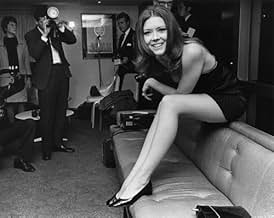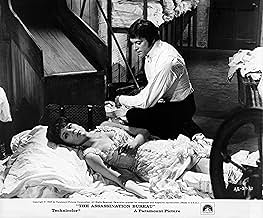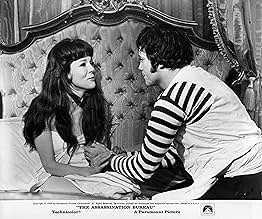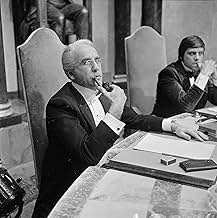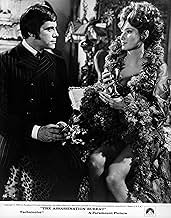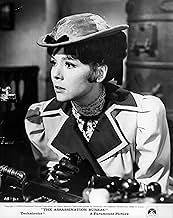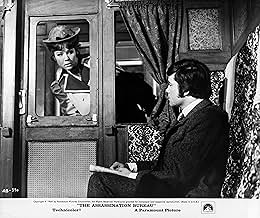ÉVALUATION IMDb
6,4/10
3,9 k
MA NOTE
Ajouter une intrigue dans votre langueA woman causes a group of assassins to face their greatest challenge.A woman causes a group of assassins to face their greatest challenge.A woman causes a group of assassins to face their greatest challenge.
- Prix
- 2 nominations au total
Curd Jürgens
- Gen. von Pinck
- (as Curt Jurgens)
John Abineri
- Police Inspector
- (uncredited)
John Adams
- French President
- (uncredited)
Jonathan Adams
- French President
- (uncredited)
Avis en vedette
The big selling point of "The Assassination Bureau" is that it was based on an unfinished novel by Jack London -- "Unfinished" being an euphemism for "abandoned". Long after London's death it was finished by a lesser writer and that version is the basis for this movie.
A superb cast, headed by Oliver Reed and Diana Rigg, is underemployed.
Reed plays the chairman of the Assassination Bureau, Ltd. For a price, the bureau will undertake the homicide of deserving victims. Like a Star Chamber court they weigh each case by their own sense of justice.
Rigg, an enterprising journalist, decides to end the bureau by approaching Reed for a hit. Reed accepts, only to discover she wants Reed to assassinate himself. Amused, he accepts. The bureau, he thinks, has become too mercenary, killing whether they've carefully weighed the justice of the murder or not.
Bringing it before the Bureau, Reed suggests they clean house -- either they kill the chairman, or he kills all of them.
And this is just in the first fifteen minutes.
What follows is an episodic cat-and-mouse game and, like all episodic features, some episodes work better than others. The scenes in Switzerland and Vienna, for example, are remarkably uninteresting, while the scenes in Venice show flashes of brilliance. Best scene: Diana Rigg, swathed in only a towel, trying to discover whether there is a bomb in her room, whether it's just a clock, or whether it's altogether her imagination. The most embarrassing is an extended foray in a French bordello.
Scrumptuous turn-of-the-century sets, far better than anything in similar period features like "Chitty Chitty Bang Bang", make for great eye-candy. The whole feature plays light-handedly, so its treatment of death never comes off even as black-comedic, as with the superior "The Wrong Box". To accentuate the joking element is the addition of a wacky late-sixties type song about love that makes the Carpenters sound profound.
Silly as it is, and dull as it can be in spots, its high spirit is infectious. How much of it is Jack London, I don't know, but it's a far cry from "The Sea Wolf"
A superb cast, headed by Oliver Reed and Diana Rigg, is underemployed.
Reed plays the chairman of the Assassination Bureau, Ltd. For a price, the bureau will undertake the homicide of deserving victims. Like a Star Chamber court they weigh each case by their own sense of justice.
Rigg, an enterprising journalist, decides to end the bureau by approaching Reed for a hit. Reed accepts, only to discover she wants Reed to assassinate himself. Amused, he accepts. The bureau, he thinks, has become too mercenary, killing whether they've carefully weighed the justice of the murder or not.
Bringing it before the Bureau, Reed suggests they clean house -- either they kill the chairman, or he kills all of them.
And this is just in the first fifteen minutes.
What follows is an episodic cat-and-mouse game and, like all episodic features, some episodes work better than others. The scenes in Switzerland and Vienna, for example, are remarkably uninteresting, while the scenes in Venice show flashes of brilliance. Best scene: Diana Rigg, swathed in only a towel, trying to discover whether there is a bomb in her room, whether it's just a clock, or whether it's altogether her imagination. The most embarrassing is an extended foray in a French bordello.
Scrumptuous turn-of-the-century sets, far better than anything in similar period features like "Chitty Chitty Bang Bang", make for great eye-candy. The whole feature plays light-handedly, so its treatment of death never comes off even as black-comedic, as with the superior "The Wrong Box". To accentuate the joking element is the addition of a wacky late-sixties type song about love that makes the Carpenters sound profound.
Silly as it is, and dull as it can be in spots, its high spirit is infectious. How much of it is Jack London, I don't know, but it's a far cry from "The Sea Wolf"
To enjoy and even admire this period piece, set just before the industrial revolution of the 20th century, one has to understand what it is. It's certainly not a parody of James Bond or some off cue thriller; it's high comedy, a farce of magnificent proportions, aided & abetted by fine action. You have to get in on the joke with Oliver Reed, Diana Rigg, Telly Savalas and the rest, all obviously enjoying themselves, but not at our expense. Let them amuse you and bemuse you, and you'll have a grand time. By this point, over 35 years after this was filmed, it may be difficult for younger viewers to follow along with Reed and realize when he is winking at them during one of his outrageous pronouncements. He's the head of the organization of the title - it is what you think it is, no pretensions there - its business is killing people, for money. But that is about the only thing which is up front in this picture. Everyone is not who they seem to be, usually having a decent public face and the secret hidden one - the one catering to the less moral side of all of us.
This is probably my favorite Oliver Reed performance. He grabs the role of the debonair gentleman assassin and turns it into uniquely his own. Some of his dry line delivery, particularly when sparring with Rigg, is priceless; my favorite is when they meet and she informs him who she wants killed; he soon demands her reasons, yelling "Is That it? Is That It!?!" Later in the film, she calls him annoying. "I have been told that," he replies, but never have we heard the line spoken that way. He needs to carry the picture, outsmarting and fooling all the other sneaky assassins out for his blood with disguises, role-playing and careless bravado. This is where the picture really shifts into high gear, turning into a duel among a group of master killers who, luckily, do not yet have the advantages of 20th century weaponry. The supporting cast are all terrific, including Savalas as Reed's main nemesis, Jurgens as a German general and Noiret who, besides being an assassin, also runs a brothel (no limits to the French).
The script and dialog are continually witty throughout, many of the lines classic and too numerous to mention here. Again, some of this may be lost on anyone under 30 years old; in a way, this brand of humor can now be termed sophisticated - no gross bodily function joking. It does revolve around death, so a kind of dark farce results, of course - yet it's not morbid. That's probably because most of the victims deserve their ends as presented here; they made their beds, as it were. The dialog is complemented by inventive turns in the plot; there's actually quite a bit of suspense as the story turns & twists here and there, especially during the sequence in Venice, where the order of characters being killed is not as expected. The finale is also suspenseful - you may wonder how Reed will pull it off, stopping an entire zeppelin and its crew. And please keep in mind the special FX are over 35 years old, as well. Just glorious stuff.
This is probably my favorite Oliver Reed performance. He grabs the role of the debonair gentleman assassin and turns it into uniquely his own. Some of his dry line delivery, particularly when sparring with Rigg, is priceless; my favorite is when they meet and she informs him who she wants killed; he soon demands her reasons, yelling "Is That it? Is That It!?!" Later in the film, she calls him annoying. "I have been told that," he replies, but never have we heard the line spoken that way. He needs to carry the picture, outsmarting and fooling all the other sneaky assassins out for his blood with disguises, role-playing and careless bravado. This is where the picture really shifts into high gear, turning into a duel among a group of master killers who, luckily, do not yet have the advantages of 20th century weaponry. The supporting cast are all terrific, including Savalas as Reed's main nemesis, Jurgens as a German general and Noiret who, besides being an assassin, also runs a brothel (no limits to the French).
The script and dialog are continually witty throughout, many of the lines classic and too numerous to mention here. Again, some of this may be lost on anyone under 30 years old; in a way, this brand of humor can now be termed sophisticated - no gross bodily function joking. It does revolve around death, so a kind of dark farce results, of course - yet it's not morbid. That's probably because most of the victims deserve their ends as presented here; they made their beds, as it were. The dialog is complemented by inventive turns in the plot; there's actually quite a bit of suspense as the story turns & twists here and there, especially during the sequence in Venice, where the order of characters being killed is not as expected. The finale is also suspenseful - you may wonder how Reed will pull it off, stopping an entire zeppelin and its crew. And please keep in mind the special FX are over 35 years old, as well. Just glorious stuff.
This is the kind of movie made with care and respect for the audience:lavish sets,dazzling costumes,and a very attractive cast including Diana Rigg,Telly Savalas -both teamed for "on her majesty's secret service" the same year-,Philippe Noiret,Curd Jurgens and the sadly missed Oliver Reed.
The screenplay is often full of wit and humor,with such lines as "if there's a war,people will kill each others for a penny,and we will have to shut up shop (our "assassination bureau").Actually the whole movie is a long chase through a chocolate-box Europa with a lot of traps,bombs and disguises.Diana Rigg's appearances run the whole gamut from a Victorian prude resembling Mary Poppins to a femme fatale,from a widow in deep mourning to a nun,she's astonishing.So does (and is )Oliver Reed,who plays some British Arsène Lupin.History is given a rough ride when Francis-Ferdinand is murdered in Vienna (instead of Sarajevo) but who cares?
Best scene:Diana Rigg is alone in her hotel bedroom in Venice,Italy:she can hear a ticking.No,it's not the clock.So she rushes into her bathroom where a tap(faucet) is dripping.But when it's closed,the noise still remains.Is-it a bomb? .The brothel scene where Rigg is mistaken for a hooker is also great fun!
Two movies made in the seventies might have been influenced by Basil Dearden's amusing comedy:Douglas's Hickox's "theater of blood" (1973) also starring Rigg- a treat that should not be missed-and Ted Kotcheff's "who's killing the great chefs of Europe?" (1978)-Jacqueline Bisset cooks a bombe glacée here-.The people who liked this movie could do worse than picking those delightful black comedies.
The screenplay is often full of wit and humor,with such lines as "if there's a war,people will kill each others for a penny,and we will have to shut up shop (our "assassination bureau").Actually the whole movie is a long chase through a chocolate-box Europa with a lot of traps,bombs and disguises.Diana Rigg's appearances run the whole gamut from a Victorian prude resembling Mary Poppins to a femme fatale,from a widow in deep mourning to a nun,she's astonishing.So does (and is )Oliver Reed,who plays some British Arsène Lupin.History is given a rough ride when Francis-Ferdinand is murdered in Vienna (instead of Sarajevo) but who cares?
Best scene:Diana Rigg is alone in her hotel bedroom in Venice,Italy:she can hear a ticking.No,it's not the clock.So she rushes into her bathroom where a tap(faucet) is dripping.But when it's closed,the noise still remains.Is-it a bomb? .The brothel scene where Rigg is mistaken for a hooker is also great fun!
Two movies made in the seventies might have been influenced by Basil Dearden's amusing comedy:Douglas's Hickox's "theater of blood" (1973) also starring Rigg- a treat that should not be missed-and Ted Kotcheff's "who's killing the great chefs of Europe?" (1978)-Jacqueline Bisset cooks a bombe glacée here-.The people who liked this movie could do worse than picking those delightful black comedies.
In turn of the century London, a female journalist (Diana Rigg) pays for an assasination organisation to assassinate their own leader (Oliver Reed) whom she eventually falls in love with. He in turn bumps off any of his assailants.
Produced and co-written by Michael Relph, this zany big budget comedy is very much of its time with a dark himour that doesn't quite pay off; the comedy is not sharp enough to have a broad appeal or even provide many laughs, but is a fast moving, colourful film (shot by Geoffrey Unsworth) that has plenty to look at.
Produced and co-written by Michael Relph, this zany big budget comedy is very much of its time with a dark himour that doesn't quite pay off; the comedy is not sharp enough to have a broad appeal or even provide many laughs, but is a fast moving, colourful film (shot by Geoffrey Unsworth) that has plenty to look at.
If the awestruck viewer of this lovely, spacious-looking and delightful satire can get past the multiple locales, the elaborate and often-sumptuous style and the sheer colorfulness of the goings-on, there is a solid and interesting plot line under propping the entire gorgeous edifice. Behind the overwhelming "stylishness" that first greets the eyes, and it is a wonderfully varied and colorful production, Jack London's fascinating story of the "assassination bureau" has been updated by writer Robert L. Fish to be an "ethical" idea gone wrong. The basic premise is that the pragmatic and cynical end of the 19th Century with its pseudo-Christian thug-like monarchs, dynasts and empire-builders was unjust to individual victims. because this situation led some to wish the worst offenders removed from their tyrannies and interferences, Ivan Dragomilov's father created the Assassination Baureau, Ltd. However, an instrument designed to remove the worst offending baddies from an imperfect world has now become a murder-for-hire problem. Enter Diana Rigg, who finds out how to hire the Bureau to take a contract on--Ivan Dragomilov, played intelligently by Oliver reed. He accepts the contract, recognizing what his father's "noble instrument" has been allowed to become. The remainder of the film's scenes then feature a long and fascinatingly funny duel between Rigg and Oliver and the bureau's chiefs, against whom Reed has declared war. These stalwarts include stalwarts such as the great Curt Jurgens in Germany, Cilve Revill in Italy, Telly Savals in London and others in Paris and elsewhere. Sweeping scenes such as the French bordello scenes, the German Restaurant duel, the hilarious Italian caper, the flaming-lighter escape on the train trick and others lead to the climactic race to save London from Savalas's explosive plot. The lovely mounting of the production is highlighted by Basil Dearden's wonderful ability with actors, blocking, and camera-work, Art Director Michael Relph's award-level contributions, magnificent costumes luminous lighting and many other achievements. Many other actors including Beryl Reed, Philippe Noiret and pretty Annabella Incontrera contributed; Ron Grainer's music is a great asset also. But I believe what sets this satirical thriller apart is its realistic ethical dimension; the fact that the Age of Empire was an age of evil governments and unethical pretensions by state tsars has not even now been recognized. This long and intensely-diverting film is a beautiful-polished needle that pricks a much-needed hole in the gasbag of public-interest-tyranny's post modernistic pretensions. It is a film that deserves to be laughed with, applauded and considered carefully for its positive sense-of-life and all-around sparkling wit, dialogue and spirit of adventurous fun.
Le saviez-vous
- AnecdotesJack London's original novel was left markedly incomplete at the time of his death, and it was not until many decades later that the thriller-writer Robert L. Fish (also known as Robert L. Pike) finished it for publication, amidst much publicity. The novel is noticeably more serious in tone than this movie, although a New York Times review at the time called it "delightfully ridiculous."
- GaffesIn the scene about 40-45 minutes in where Lord Bostwick visits General Van Pinck whilst the latter is at fencing practice, there's a map of Europe on the wall. Although this film ostensibly takes place before World War I, the map is of post-Versailles Europe, c.1925-1939.
- Citations
Miss Winter: With your ideas, I'm surprised you're shocked at the thought of war.
Ivan Dragomiloff: Not at all. It's purely a matter of business. How can we charge our sort of prices with everybody happily killing each other for a shilling a day?
Meilleurs choix
Connectez-vous pour évaluer et surveiller les recommandations personnalisées
- How long is The Assassination Bureau?Propulsé par Alexa
Détails
- Date de sortie
- Pays d’origine
- Langues
- Aussi connu sous le nom de
- The Assassination Bureau
- Lieux de tournage
- Zürich, Kanton Zürich, Suisse(reconstructed in studio set)
- société de production
- Consultez plus de crédits d'entreprise sur IMDbPro
- Durée1 heure 50 minutes
- Mixage
- Rapport de forme
- 1.85 : 1
Contribuer à cette page
Suggérer une modification ou ajouter du contenu manquant

Lacune principale
By what name was Assassinat en tous genres (1969) officially released in India in English?
Répondre
